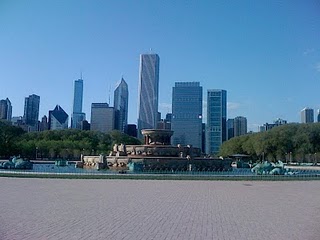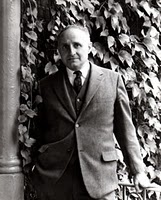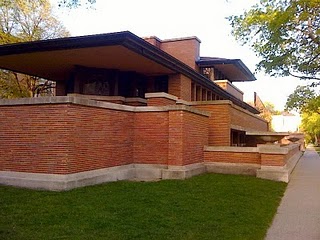Chicago
 Splendid day in Chicago yesterday. Began it with another run along Lake Michigan. Then down to Hyde Park early to record an episode (for later release) of PoemTalk. Don Share (senior editor of Poetry), Judith Goldman (on the U of C faculty, in the Society of Fellows) and David Pavelich (modern poetry bibliography in Special Collections at U of C) - poets all three - joined me to talk about a pair of poems: H.D.'s "Sea Poppies" and Jennifer Scappettone's "Vase Poppies." (I've written a little about this pairing earlier here.) A very good session. I begin to realize that a keen choice of poem (or poems, as in this special case) enables the conversation almost automatically (that is, with little effort needed on my part as moderator). During an hour or so between PoemTalk and the Modern Poetry Symposium sponsored by Special Collections, I met up with Brandon Fogel, a former student of mine at Penn and now, with Judith, a faculty member of the Society of Fellows. Brandon's field is philosophy and physics (not just the idea of physics in some squishy history of science sense, but real hard-sci physics). As an undergrad at Penn he majored in English and physics, the only student to do so in my 25 years at the university. Unsurprisingly, the gang already surrounding me knew Brandon, so it was a confab. Then to the conference.
Splendid day in Chicago yesterday. Began it with another run along Lake Michigan. Then down to Hyde Park early to record an episode (for later release) of PoemTalk. Don Share (senior editor of Poetry), Judith Goldman (on the U of C faculty, in the Society of Fellows) and David Pavelich (modern poetry bibliography in Special Collections at U of C) - poets all three - joined me to talk about a pair of poems: H.D.'s "Sea Poppies" and Jennifer Scappettone's "Vase Poppies." (I've written a little about this pairing earlier here.) A very good session. I begin to realize that a keen choice of poem (or poems, as in this special case) enables the conversation almost automatically (that is, with little effort needed on my part as moderator). During an hour or so between PoemTalk and the Modern Poetry Symposium sponsored by Special Collections, I met up with Brandon Fogel, a former student of mine at Penn and now, with Judith, a faculty member of the Society of Fellows. Brandon's field is philosophy and physics (not just the idea of physics in some squishy history of science sense, but real hard-sci physics). As an undergrad at Penn he majored in English and physics, the only student to do so in my 25 years at the university. Unsurprisingly, the gang already surrounding me knew Brandon, so it was a confab. Then to the conference.
Garin Cycholl gave a wonderful paper on the poet Sterling Plumpp and jazz geography; I don't know much about Plumpp so I was being well schooled. Stephanie Anderson, a doctoral student here at U of C, then gave a talk on Chicago magazine, which Alice Notley edited during her several years here in Chicago in the early 70s (and also a bit afterward--when she and Ted Berrigan were in Europe). Paired with the Notley paper was Nancy Kuhl's on Margaret Anderson and The Little Review. Both these papers made use of fabulous rare materials. Nancy is the curator of poetry collections at the Yale American literature collection at the Beinecke. (I'd corresponded with her in recent years about the various manuscripts I used to research and write Counter-Revolution of the Word but had not met her until yesterday.) Nancy is also a fine poet, as witness The Wife of the Left Hand, a copy of which she gave me yesterday.
The Alice Notley/Margaret Anderson pairing - thank you, David Pavelich - was inspired, suggesting all kinds of things about the terms "editing" and (versus) "curating"; raising questions about young avant-garde women who find themselves at the center of a writing scene ("enabling," etc.). Notley very consciously sought to do all this without much help from Berrigan, and after she gave birth (fall '72?) he guest-edited one issue of Chicago--producing a very different choice of poets. Stephanie suggested that Notley meant to show this difference to their friends and colleagues, to prove, in a sense, that the other issues bore no trace of Ted's hand.
 Don Share (he of the equanimous disposition and wonderfully sure, calm voice--a "radio voice," as they used to say) and I gave a pair of papers on the editorship of Henry Rago at Poetry: 1955 (when he took over from the zig-zaggy Karl Shapiro) to 1969 (when Rago suddenly died of a heart attack, not long after an apparently final retirement). My take, in short, is that 1955-1960 is a mixed record for Rago and Poetry at best, and that in 1960 or so Rago caught some fire. Don didn't disagree with my division of the Rago years into two, and he was nicely able to elaborate on all sorts of particular matters of editorship. During the discussion afterward, we began to talk about the special burden - given its special legacy of modernism - facing any editor of Poetry, and got close to a full-out conversation about the situation of Poetry today...when time ran out. But the topic had been raised (what do the failures of Rago's first four or five years teach us?) and it was very good.
Don Share (he of the equanimous disposition and wonderfully sure, calm voice--a "radio voice," as they used to say) and I gave a pair of papers on the editorship of Henry Rago at Poetry: 1955 (when he took over from the zig-zaggy Karl Shapiro) to 1969 (when Rago suddenly died of a heart attack, not long after an apparently final retirement). My take, in short, is that 1955-1960 is a mixed record for Rago and Poetry at best, and that in 1960 or so Rago caught some fire. Don didn't disagree with my division of the Rago years into two, and he was nicely able to elaborate on all sorts of particular matters of editorship. During the discussion afterward, we began to talk about the special burden - given its special legacy of modernism - facing any editor of Poetry, and got close to a full-out conversation about the situation of Poetry today...when time ran out. But the topic had been raised (what do the failures of Rago's first four or five years teach us?) and it was very good.
After just a few minutes with Nancy Kuhl I remembered that I read (at the Regenstein, in fact; in the Poetry archives) about Lee Anderson's recordings of modern poets--recalled that Anderson (in the late 50s?) was preparing to give these recordings to Yale. Nancy of course knew about the Anderson recordings. There they are, still at Yale. Might it be possible for us at PennSound to collaborate with our pals at Yale to make available some of these recordings? You can be sure we'll be on the train to New Haven soon to discuss.
 On the drive from Hyde Park to Chinatown for dinner last night, we passed by Frank Lloyd Wright's Robie House. The horizontal flat stone thing looks so utterly natural in its urban prairie setting. I was a little shocked by this. I can usually see architecture in photographs and get it sufficiently; but Robie House needs to be seen as it is, just there, on a residential corner in this sweet little university town on the flat south end of its broad-shouldered city.
On the drive from Hyde Park to Chinatown for dinner last night, we passed by Frank Lloyd Wright's Robie House. The horizontal flat stone thing looks so utterly natural in its urban prairie setting. I was a little shocked by this. I can usually see architecture in photographs and get it sufficiently; but Robie House needs to be seen as it is, just there, on a residential corner in this sweet little university town on the flat south end of its broad-shouldered city.